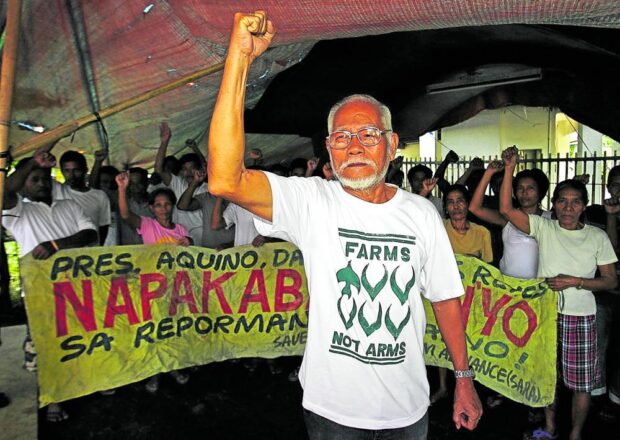
LEGACY OF STRUGGLE Activist and peasant leader Jaime Tadeo leading a protest rally in 2012 together with farmers from Quezon province. —INQUIRER FILE PHOTO
MANILA, Philippines — Jaime “Ka Jimmy” Tadeo, the peasant leader, organizer, and 1986 Constitutional Commission delegate who played a vital role in pressing for the inclusion of agrarian reform in the 1987 Constitution, died due to diabetes complications on Sunday, two days short of his 85th birthday.
Tadeo passed away in his sleep at around 1:30 a.m.
“It came as a shock to all of us,” his son, Jerome, told the Inquirer. “But we consider it fortunate that he did not suffer.”
His wake will be held in his hometown of Plaridel in Bulacan province where his family plans to hold a vigil on Tuesday, his birthday.
Born in Bocaue, Bulacan, on March 28, 1938, Tadeo was among the leading champions of agrarian reform in the country.
In 1984, he formed the Alyansang Magbubukid sa Gitnang Luzon, which later joined up with other peasant organizations to form the Kilusang Magbubukid ng Pilipinas (KMP).
In a short statement, the KMP recognized Tadeo for supporting the Genuine Agrarian Reform Bill filed by Anakpawis in 2018.
Ideological differences had led him to break away from KMP to establish in 1994 the Demokratikong Kilusang Magbubukid ng Pilipinas, later known as Paragos Pilipinas, which promotes sustainable agriculture and an organic way of farming.
‘Irreplaceable figure’
To many of his colleagues, Tadeo’s outsized legacy made him an “irreplaceable figure” in the fight to emancipate farmers, according to Romeo Royandoyan, Centro Saka executive director.
“He was no simple advocate,” Royandoyan said. “He was more than just a leader and organizer, but he championed… genuine land reform that was beyond the Comprehensive Agrarian Reform Program (CARP).”
Until his final years, Tadeo continued to dream of land redistribution for the poorest majority in the country, believing that the Philippines “[could] only achieve real democracy if it [enacted] genuine agrarian reform,” he had said.
An agriculture major from Araneta University, Tadeo once served as national president of KMP, which was formed in the wake of the 1986 Edsa People Power Revolution.
After the ouster of the late dictator Ferdinand Marcos Sr., President Corazon Aquino appointed him sole peasant representative to the 1986 Concom.
Royandoyan said Tadeo “played a huge role” in making sure there was a provision in the 1987 Constitution mandating the state to undertake an agrarian reform program to give farmers the lands they till.
In her closing remarks in October 1986, Concom president Cecilia Muñoz-Palma cited Tadeo’s distinctive legacy in the new charter of including “agrarian land reform which, according to him, however, is still full of loopholes.”
In January 1987, Tadeo, as KMP chair, led a march to Malacañang with more than 8,000 members of his group, to present the demands of farmers directly to Aquino.
The protest, however, took a grim turn, and 13 farmers were gunned down by the Marines in what would later be called the “Mendiola Massacre.”
Trumped-up charges
In 1990, Tadeo was jailed for what he described as trumped-up charges of swindling in connection with a P200,000 rice inventory shortfall in a farmers’ cooperative that he had taken over after its manager was shot dead.
The case was filed during Marcos’ martial law regime and then revived during the Aquino administration. Tadeo spent three years and three months in prison and was paroled three years later.
In 1998, he was granted a full presidential pardon by then-President Fidel Ramos in support of “full farmer empowerment.”
He wryly recalled, in a 2012 interview with the Inquirer, how he had asked Aquino for land only to get a cell in Muntinlupa instead.
His legal counsel at that time was Marvic Leonen, now a Supreme Court senior associate justice.
In a tweet, Leonen thanked his “friend… for the honor of allowing me to be your counsel in so many cases in my younger years.”
“I learned a lot from our struggles,” Leonen said. “You made a huge contribution to struggling farmers.”
‘Prison within a prison’
Tadeo had said that “Muntinlupa was a microcosm of Philippine society.”
“It is a lake within a lake, like Taal Lake. A prison within a prison. Those who are in jail are the poor,” he said.
During the 2022 presidential campaign, he and other framers of the 1987 Constitution endorsed then Vice President Leni Robredo, saying her platform was the most responsive to the aspirations of the country’s most vulnerable sectors.
“He really had no substitute in this cause,” Royandoyan said. “His contribution to the fight for agrarian reform was immense.”
Before his health deteriorated last year, Tadeo continued to fight for farmers and their rights, even attending meetings at the Department of Agrarian Reform, according to his son Jerome.
His father’s dedication to the cause stole time away from his family, Jerome said, adding: “[W]e understood because he [really] did not want to see farmers being exploited.”
Even so, Tadeo never shirked his duties at home. He was a loving and “democratic” family man, who urged his children to follow their own dreams and not feel pressured by the path he chose.
“He would have given his life for farmers,” Jerome said. “Yet he never wanted to be called a saint—he simply saw it as his duty [to] fight for justice, because if there is justice, there is freedom.”
Tadeo is survived by his wife Crescencia and children Jerome, Catherine, Joshua, Jacob, and Bonifacio.